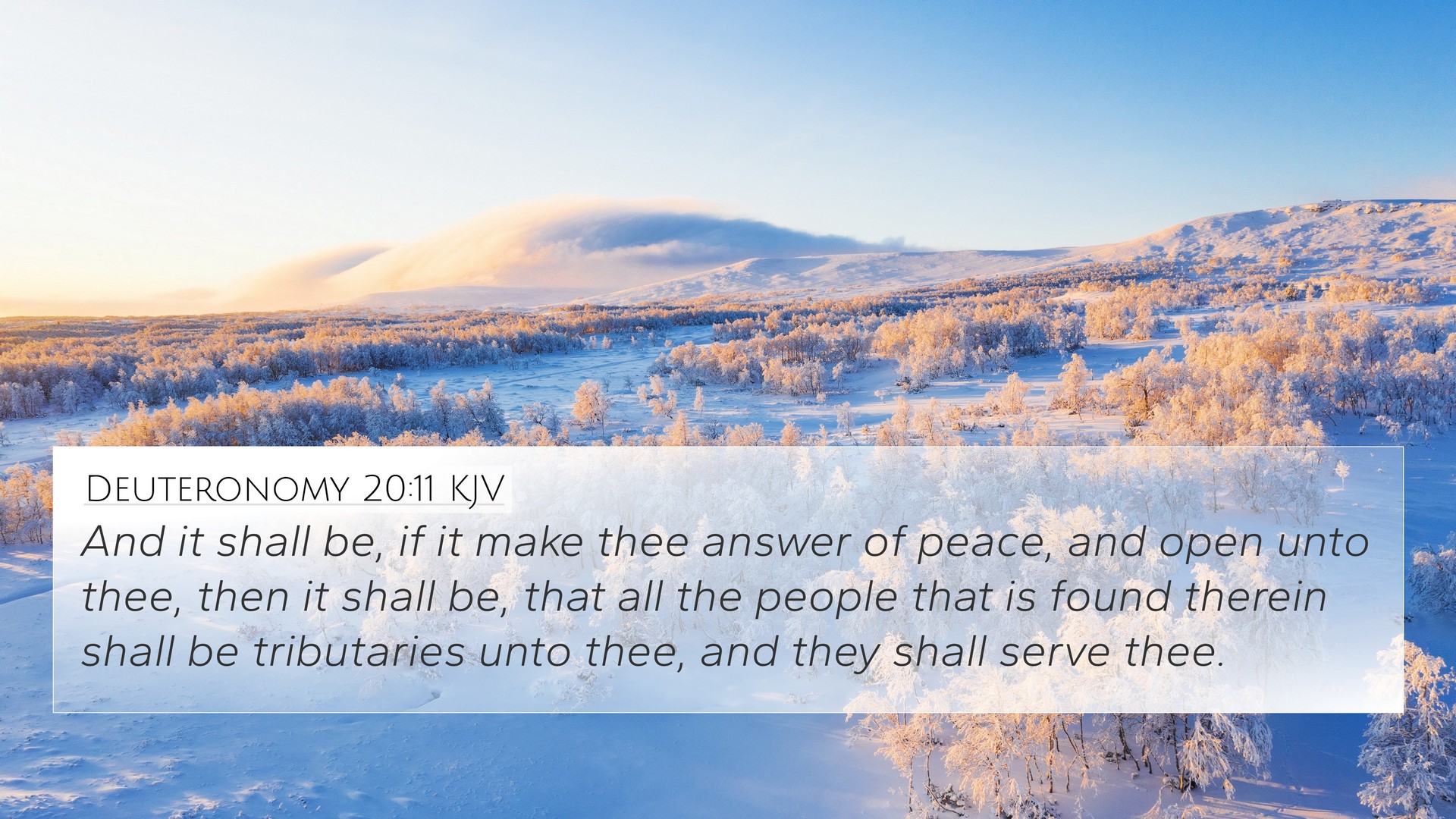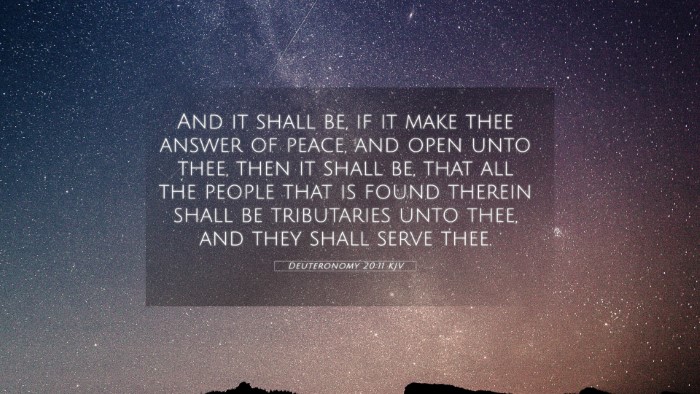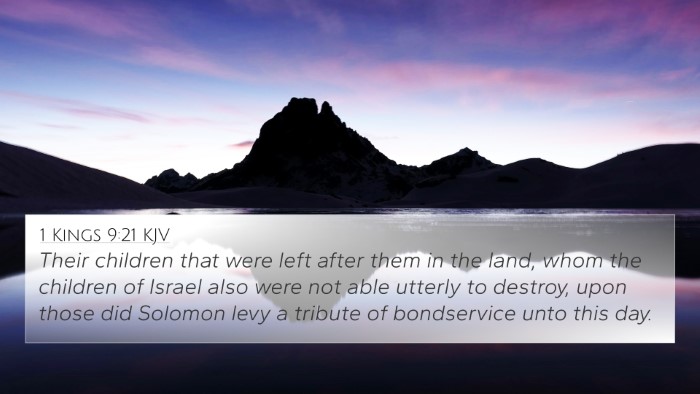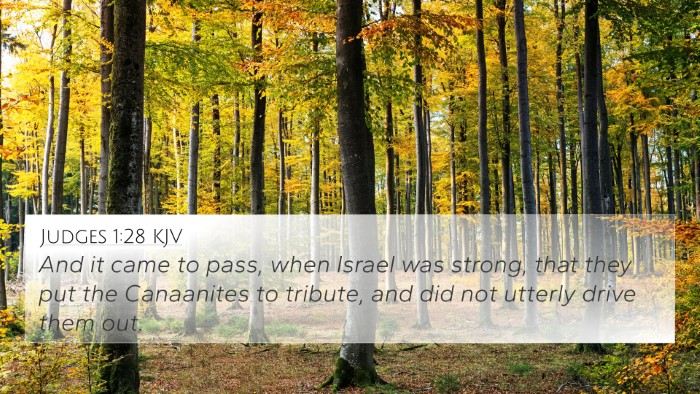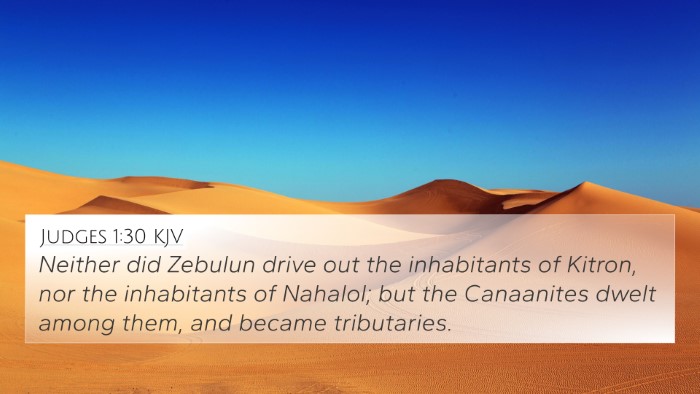Understanding Deuteronomy 20:11
Bible Verse: Deuteronomy 20:11 [BibleVerseID: 05020011]
In this verse, Moses instructs the Israelites on how to deal with cities that they will conquer. The verse emphasizes the importance of offering peace to a city before engaging in battle, reflecting on a theme of mercy and opportunity for repentance.
Summarized Interpretation
- Matthew Henry's Commentary: Henry highlights that God’s law provided a means of peace even in warfare. If a city submitted and accepted their terms, it was better for all, marking an example of God’s kindness.
- Albert Barnes' Notes: Barnes elaborates that offering peace first was a demonstration of grace and a chance for the enemy to choose submission rather than face destruction. This approach illustrates God's desire for reconciliation over conflict.
- Adam Clarke's Commentary: Clarke discusses the strategic necessity of such an offer, noting how it served both a humanitarian purpose and a tactical advantage during warfare. The Israelites were to present themselves as not only conquerors but also bearers of peace.
Thematic Connections
This verse is excellent for understanding the connections between Bible verses related to peace and conflict. It establishes a precedent for how God's people should approach enemies and is reflected throughout Scripture.
Cross-References
Here are some Bible verses that relate well to Deuteronomy 20:11, providing a broader context and illustrating the principles discussed:
- Luke 14:31-32 - “Or what king, going to make war against another king, sits not down first, and consults whether he be able with ten thousand to meet him that cometh against him with twenty thousand?” - This verse echoes the theme of assessing conflict and pursuing peaceful resolutions.
- Matthew 5:9 - “Blessed are the peacemakers: for they shall be called the children of God.” - Here, the beatitude expresses a general call to seek peace, resonating with the intentions behind the offer in Deuteronomy.
- Proverbs 16:7 - “When a man’s ways please the LORD, he maketh even his enemies to be at peace with him.” - This verse reinforces the idea that God can influence the hearts of adversaries toward peace.
- Romans 12:18 - “If it be possible, as much as lieth in you, live peaceably with all men.” - This New Testament counsel aligns with the precept of offering peace as shown in the Old Testament scripture.
- Isaiah 2:4 - “And he shall judge among the nations, and shall rebuke many people: and they shall beat their swords into plowshares, and their spears into pruning hooks: nation shall not lift up sword against nation, neither shall they learn war anymore.” - Prophetic imagery that illustrates a hopeful vision of peace.
- 2 Corinthians 5:18 - "And all things are of God, who hath reconciled us to himself by Jesus Christ, and hath given to us the ministry of reconciliation." - A New Testament reflection on God’s desire for peace and reconciliation.
- Ephesians 6:15 - “And your feet shod with the preparation of the gospel of peace;” - Illustrates the importance of spreading peace, much like the offer presented in Deuteronomy.
Comparative Study Insights
Through cross-referencing Biblical texts, one can observe numerous parallels and thematic connections that encourage an understanding of how God desires peace among humanity. The thematic Bible verse connections serve as a guide to comprehend God’s overarching plan for humanity concerning conflict and resolution.
How to Utilize Cross-References
Using a bible concordance or bible cross-reference guide can greatly enhance the understanding of this verse by identifying relevant passages that further develop its themes. Here are some tools to consider for a comprehensive bible cross-reference system:
- Bible reference resources - These resources can help guide your study.
- Comprehensive Bible cross-reference materials - Useful for deeper explorations into how verses are interconnected.
- Cross-reference Bible study methods - Suggestions could include thematic studies, topical studies, or verse mapping.
Conclusion
The invitation to offer peace in Deuteronomy 20:11 is a strong foundation for understanding God's expectations of His people, encouraging reconciliation over conflict. Studying this verse through various inter-biblical dialogues can deepen our insight into divine principles of peace and mercy.
When approaching Biblical texts, consider how these connections can enrich your understanding and application of God's word in daily life.
